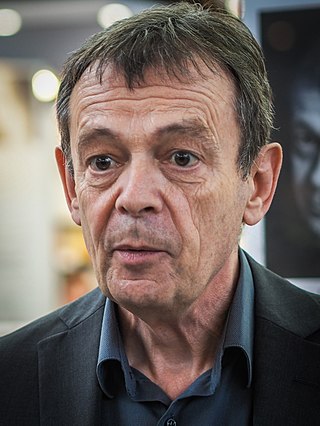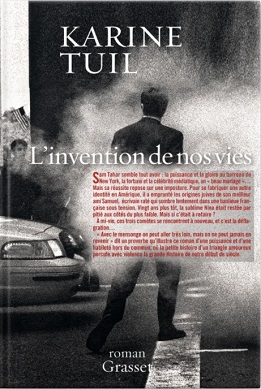
Karine Tuil (born 3 May 1972 in Paris) is a French novelist who has written several award-winning novels in French and English. Her works have themes ranging from marriage and Jewish identity to detention centers and corporate politics.

Karine Tuil (born 3 May 1972 in Paris) is a French novelist who has written several award-winning novels in French and English. Her works have themes ranging from marriage and Jewish identity to detention centers and corporate politics.
Tuil was born in Paris on 3 May 1972. After obtaining her baccalaureate, she studied law, and received a Diploma of Advanced Studies in Communication Law at the University of Paris II (Panthéon Assas). [1] Tuil was practicing as a lawyer but prepared a thesis she did not defend. She then decided to devote herself to writing.
Tuil's first published novel, Pour le Pire, was noticed by Jean-Marie Rouart. [2] It was published in September 2000 by Plon publishing house. The novel describes the slow decomposition of a couple. Her second novel, Forbidden, (Plon 2001) – a satirical account of the identity crisis of an old Jew – was selected for the prize Goncourt Prize and the Wizo Prize. It is translated in several languages and was adapted to the theater by Salomé Lelouch in 2014 under the title The marriage of Mr Wessmann. [3] [4]
Female Sex, published in 2002 is a comedy about mother-daughter relationships. This third novel concludes her trilogy on the Jewish family. In 2003, she published Tout sur mon frère, (Éditions Grasset), which explores the negative effects of autofiction. It was nominated for the Booksellers' Prize and was a finalist for the France-Television Award.
In 2005, Tuil published When I Was Funny, which is a French comedy set in New York. In 2007, Douce France appeared, a social novel about administrative detention centers.
In 2008, Tuil released Domination. It is about power politics in the publishing world through the prisms of identity. Domination was a first selections for the Goncourt prize, the Goncourt high school prize and the Flore prize. Tuil she received the Stendhal Scholarship from the Ministry of Foreign Affairs for this novel.
In 2010, her novel Six Months, Six Days was a first and second selection of the 2010 Goncourt Prize, the first selection of the Interallié Prize and the Goncourt high school students' prize. In 2011, she won the prix littéraire du Roman News. [5]
Tuil's ninth novel entitled L'Invention de nos vies [6] [7] [8] was published in September 2013 by the Grasset publishing house. This novel looks at "the story of a young man of Arab descent, Samir, who, to succeed in his career as a business lawyer in New York," borrows "part of the identity of his best childhood friend, a Jew named Samuel [9] " . The novel appeared in several selections of literary prizes, including the Femina, Interallié, Goncourt, Goncourt high school students, and the prix des libraires. It was a finalist of the Goncourt Prize. [10] L'Invention de nos vies was translated in several countries including Great Britain, the United States (under the title The age of reinvention [11] [12] ), Canada, [13] Italy, [14] [15] China, Greece, the Netherlands, [16] and Germany. [17]
Tuil's novel The Insouciance was published in 2016. On the publication of this tenth novel, the newspaper Le Monde in 2016 writes, on all her books: "Some themes are obvious. For example the Jewishness of the characters. And subsequently: the father, the law, the Kafkaesque humor - Insouciance adds in the author's Letter to the father". [18] The novel won the Landerneau Prize for readers.

The Prix Goncourt is a prize in French literature, given by the académie Goncourt to the author of "the best and most imaginative prose work of the year". The prize carries a symbolic reward of only 10 euros, but results in considerable recognition and book sales for the winning author. Four other prizes are also awarded: prix Goncourt du Premier Roman, prix Goncourt de la Nouvelle, prix Goncourt de la Poésie (poetry) and prix Goncourt de la Biographie (biography). Of the "big six" French literary awards, the Prix Goncourt is the best known and most prestigious. The other major literary prizes include the Grand Prix du roman de l'Académie française, the Prix Femina, the Prix Renaudot, the Prix Interallié and the Prix Médicis.

The Prix Théophraste-Renaudot or Prix Renaudot is a French literary award.

Serge Bramly is a French-language writer and essayist.

Jean-Marie Rouart is a French novelist, essayist and journalist. He was elected to the Académie française on 18 December 1997.

Lucien Bodard was a French reporter and writer on events in Asia.
The prix Interallié, also known simply as l'Interallié, is an annual French literary award, awarded for a novel written by a journalist.

Léonora Miano is a Cameroonian author.
The Prix Alain-Fournier is a French literary prize, awarded by the town of Saint-Amand-Montrond in honour of Alain-Fournier, author of Le Grand Meaulnes. It is intended to give encouragement to a novelist at the beginning of their career, and it can be awarded for first, second or third novels, provided that the author has not previously received any recognition at a national level.

Alexandre Najjar is a Lebanese and French writer, lawyer and literary critic. He was born in Beirut and studied at Panthéon-Assas University and University of Paris 1 Pantheon-Sorbonne. He holds a Doctorate in Business administration and is specialized in banking and finance law. He is the author of more than 30 books translated into more than 12 languages. In addition to poetry and novels, he has written non fiction works like the biography of Khalil Gibran, the author of The Prophet., a book about the 1936 Summer Olympic Games in Nazi Germany and a book about the Arab Spring.

Jérôme Ferrari is a French writer and translator. He won the 2012 Prix Goncourt for his novel Le Sermon sur la chute de Rome.

Pierre Lemaitre is a Prix Goncourt-winning French author and a screenwriter, internationally renowned for the crime novels featuring the fictional character Commandant Camille Verhœven.

Alice Zeniter is a French novelist, translator, scriptwriter, dramatist and director.

The Grand prix des lectrices de Elle is a French literary prize awarded by readers of Elle magazine.

Maylis de Kerangal is a French author. Her novels deeply explore people in their work lives. She has won several awards for her work, and her novels have been published in several languages. Two have been adapted as films.

Clara Dupont-Monod is a French journalist and woman of letters. She was awarded the Prix Femina in 2021.

The Age of Reinvention is a stand-alone novel written by Karine Tuil. It was originally published as L'Invention de Nos Vies by Editions Grasset & Fasquelle on August 21, 2013, and was later translated to English by Sam Taylor on December 1, 2015. It is an international best seller and a finalist for the Prix Goncourt. The book consists of four parts and has a total of 76 chapters. The audio book is read by George Newbern.

Small Country is a novel set in Burundi by the Franco-Rwandan rapper, songwriter and novelist, Gaël Faye. It was first published in France in August 2016 by Grasset, and has since been translated into 36 languages.

The Accusation is a 2021 French courtroom drama film directed by Yvan Attal. The screenplay, written by Attal and Yaël Langmann, is an adaptation of the 2019 novel Les Choses humaines by Karine Tuil. It had its world premiere on 9 September 2021 at the 78th Venice International Film Festival, and was released in France by Gaumont Film Company on 1 December 2021.

Les Choses humaines is the eleventh novel by French author Karine Tuil, published by Éditions Gallimard on 22 August 2019. It was awarded the Prix Interallié and Prix Goncourt des lycéens. In 2021, the novel was adapted into a film of the same name. The novel has not yet received an English translation.